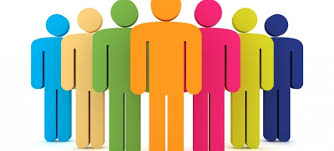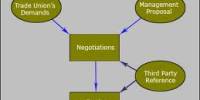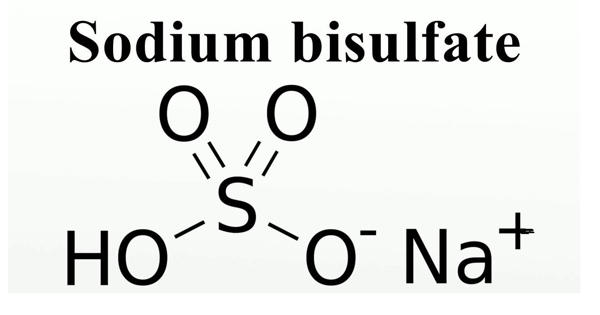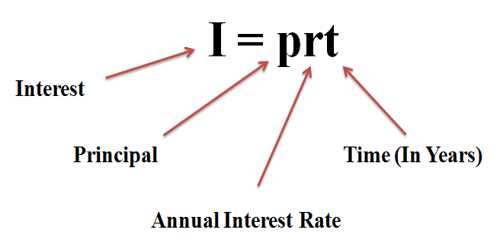The aim of this report is to find out present human resource management Policies and practices of Dhaka-Shanghai Ceramics Ltd. and give recommendations for further improvement. I went through all the functions and processes of the strategic human resource management of the organization i.e. HRM strategy, HR planning and recruitment, job evaluation procedures, training & development, performance appraisal etc through the assistance of staffs of Dhaka-Shanghai Ceramics Ltd. in the form of interview and documents review. There are some very important issues like employees payment structure reward system, HR budgeting etc. which could not be included in the report for confidential issue. But I have tried my best to work with the most important Human Resource policies and practices, which I have illustrated through the report.
Background of the study
Human resource management always deals with the proper utilization of human resources of the organization. We have studied many theoretical aspects in the classes. To get more knowledge about actual conditions we need to study in practical situation, which is conducted through project works. That is why I have selected Dhaka-Shanghai Ceramics Ltd. for my study. I am covering the HR policies and practices of Dhaka-Shanghai Ceramics Ltd. I gave the priority to Dhaka-Shanghai Ceramics Ltd. because ceramics industry is one of the fastest growing sector in our country and this company is one of the market leader. I have also considered the significance of Dhaka-Shanghai Ceramics Ltd. in the perspective of historical value, market position, diversity of the workforce, huge business turnover, profitability and some other important issues.
Research problem
Over the years the human resource division and its operations were considered as staff operations. But with the emergence of modern industry the importance of knowledge workers increased. These knowledge workers are considered as assets to organizations. So acquisition, development and maintenance of knowledge workers in organizations became critical and to so forth that human resource division’s importance increased. Even, these days some organization is considering their HR division as line division. This report’s objective is to study the HRM policies and practices in Dhaka-Shanghai Ceramics Ltd.
Research Question:
1. Is Dhaka-Shanghai Ceramics Ltd. follow the proper HRM policies ?
2. Whether the organizations HRM policies are accurately practiced ?
3. Are there any deficiencies between the practice and policies ?
4. Is there any problem in existing HRM policies and practice ?
5. What prevents to implement the policies ?
6. What are the various avenues for improving the HRM policies and practice of DSCL ?
Literature Review
An expansion of the literature and an analysis of various kinds of text books, articles, journal and common related website in the field of human resource management are reviewed in this study. Principles and techniques are used to introduce a general knowledge regarding to HRM and its policies and practices in the organization. Adding the point, a critical analysis on theories that explains queries about the HRM policies and practices is also reviewed.
According to Huang (2000), HRM policies and practices is one area that influences employees intention to leave, levels of job satisfaction, and organizational commitment. Since the concept of HRM became popular in the early 2080s, there have been increasing academic interest in the concept as well as research in the area. Early models of HRM (Beer, Spector, Lawrence, Miles, & Walton, 2084; Fombrum, Tichy & Devanna, 2084; Guest, 2089) were largely conceptual and not based on substantial empirical evidence for their validity. The 2099s saw a substantial amount of empirical research carried out to find evidence on the link between HRM policies and practices.
In recent years much of the research in the 2095s did in fact found statistical evidence for an association between HRM policis and practices(e.g. Arthur, 2098; Huselid, 2095; Ichniowski, Shaw & Prennushi, 2000). Researchers also have shown an increasing interest in the concept of HRM practices and in the link between HRM practices and organizational policies.
A significant body of previous research has reported positive associations between HRP practices and organizational policies. These studies focus on the impact of several specific HRM practices, such as compensation (Gerhart & Trevor,2006, Gomez-Mejia, 2002), training (Bartel, 2004) or performance management systems(McDonald & Smith, 2005). Other studies report the positive impact of HRM practices on organizational performance (Arthur, 2004; Bawa, 2000; Becker & Huselid, 2008a;Berg, 2009; Berg, Appelbaum, Bailey & Kalleberg, 2006; Delaney & Huselid, 2006.
Most of the studies in HRM practices and organizational policies have been conducted in the West, on the domestic operations of US firms, with a smaller number of studies carried out in the UK and Europe (e.g. Guest & Hoque,2010; Hoque, 2009), and Asia (e.g. Huang, 2005; Huang & Cullen, 2001; Khatri, 2000;Mak & Akhtar, 2003; Wan, Kok & Ong, 2007).
From the aforesaid literature review, it is evident that HRM practice is very important for any organization. But these theoretical observations may not be feasible for all companies in this country. As such this study seeks to evaluate HRM policies and practices in Bangladeshi context.
This report is important for researchers in their further research. I’m pretty sure that this report will add value to the existing research. This report is prepared in a structured way and it is full of important information.
Objective of the study
There had been some objectives set forward in doing this report so that it can be determined what tasks have to done. The objectives of the report are:
Broad objectives:
To know the Human Resource Management policies and practice of Dhaka- Shanghai Ceramics Ltd.
Specific objectives:
- To know the human resource management (HRM) policies followed in DSCL.
- Analyze the function and the operations of HRM in each level of the DSCL.
- To know about the management ablity of DSCL.
- To identify the various avenues for improving the HRM policies of DSCL.
- Analyze the current performance appraisal format & compensation.
- Identifying inherent problems associated with the existing format.
Background of Dhaka-Shanghai Ceramic Ltd. (DSCL)
The business survey and current conditions indicated the possibilities and profitability in ceramic tiles manufacturing and the foreign parties are egger to contribute to this business. China is a large country and also a big party in recent technological development. Very recent time the China shows a great progress in their economical structure. Some China parties conduct a survey on the condition of tiles business and their research brings positive outcome. This made them interested to invest in this field. Some local investors are also interested and search a strong business platform to invest their resource. This made enough sense to the China investors to start a join venture with the local business parties. The two parties made an agreement, sight a suitable location for production plant and set the Head Office at the center of the city. The rest is a great establishment, one of the largest ceramic product factories in Asia born in this country and run its business considering all the business factors. Dhaka-Shanghai Ceramic Ltd. (DSCL) is settled and become the biggest in this continent and one of the large industrial structures of tiles manufacturer in Asia. The industrial plant is much bigger to produce more product than the other in this country. To ensure the production margin and quality maintenance the authority recruits talented and skilled employees from local people and expert technicians from China. DSCL is a private limited company and is a join venture. The authority sets the head office in Dhaka city. It is in the 4th floor of BSEC Bhaban, 102 Kazi Nazrul Islam Avenue, Kawran Bazar. All the official rules and orders and the corporate activities are operating from this center. The plant is sighted in the north of Dhaka city. It is situated in Jirani Bazar, Shaver and the plant official in charge operates the manufacturing activities with in this establishment. However DSCL thinks about the challenge of the other competitors and shifting their business policies randomly and manufacturing descent products. Primarily, they started firing at the middle of the year 2006 and started the production at August of this year. The financial back up of this company is quite a marginal and it started with BDT 2,000 million of authorized capital. This could give a good impression to the possible onward improvement and the promise of serving the best product. The current capacity of the production unit is about 2.491 million square meter tiles per year and the plant installation is capable to increase it up to 13.54 million square meters per year. With its current production rate it will be flown over the top and be the leader of the business line. The marketing department is much stronger than the other companies the experienced marketing people from the others tiles manufacturing companies have joined to DSCL and enrich the executive panel of the staff-line of the organization.
The Legal Status
This plant was proposed as an industrial venture and legally formed as a private limited company which was incorporated with the registrar of the joint stock companies, government of the People’s Republic of Bangladesh under the name and style “Dhaka-Shanghai Ceramics Limited”. It is the trade mark of the company and there is a logo registered for the company’s product branding. The company will be followed the rules of the ‘Company Act’ for the private limited company for their incurrent activities.
The Board of Directors
The financial infrastructure and the authorized board of directors for the newly stabilized ceramics tiles manufacturing company is back by the spontaneous guidance of some business personnel who are both financially sound and coup with the risk taking ability. All of the sponsors have diversified experience in industrial management in both nation and international business area. They have enriched the company’s corporate activities providing their experience, proactive ness for set the objectives for the corporate executives. A brief statement of the board of director is attached below for further convenience
Key Personnel
DSCL has a very high officials and expertise recruited by the authorized personnel with the help of HR. The Directors demanded a very fine and highly sophisticated record in ceramic industries. So they employ expert individuals, technicians and workers in the industrial plant. Regarding the record of the recruitment from the HR department the name of some of the “Key Personnel” is given below
 The Employment Structure
The Employment Structure
DSCL is the largest ceramic product manufacturing company in this country; it needs a marginal number of employees. The authorized personnel (Directors) decided to recruit skilled executives, office personnel and technicians for the plant. The number of the employees recruited by the company and the segmentation according to work area is given below –
Head office 43 employees.
Factory Administration 27 personnel
Department of Kiln & Dryer (Factory) 33 employees
Press (Factory) 19 workers
Lab & Glaze preparation (Factory) 31 employees
Packing (Factory) 60 workers
Glaze line & Printing (Factory) 64 employees
Body preparation (Factory) 39 workers
Electrical department (Factory) 20 experts
Mechanical department (Factory) 18 technicians
Decoration department (Factory) 1 expert
Security (Factory) 14 employees
Factory labor 18 workers
Vision and Mission statement
Vision of the DSCL is following:
Building a true marketing led enterprise with motivated work force, innovative vision, strong revenue based product portfolio, revenue based product portfolio, customers satisfaction and understanding of global market”.
Mission of the Company
DSCL’s main mission is as following –
Each of their activities must benefit and add value to the common wealth of their society. They firmly believe that, in the final analysis they are accountable to each of the constituents with whom they interact; namely: their employees, their customers, their business associates, their fellow citizens and their shareholders.
Goals, objectives and strategies
Goals
This ceramic tiles manufacturing Company’s main goals are followings –
- Good relationship with interacting segments.
- DSCL also focuses on the supreme quality product.
Objectives
The main objective of the company is –
The better plan for long-term perspective and design the policies for clarity, responsibility and accountability to attain the extreme achievement for the company’s prosperity.
Business Strategies
Every single business organization has its own business strategy to run the business and the uniqueness of the strategies makes the output different from others. So everyone try to develop their concept of business strategy so kin and different from others. It has the large number of skilled and thoughtful management and experienced board of directors to set the business strategies for the company. The settled strategies are divided in to two lines of action in the business operation of DSCL. These tactical aspects are –
- Business level strategies, and
- Operational strategies.
Business level Strategy
Authorized business personnel decided and set the business level strategies for the company to run its activities properly and raise the perfection of the manufacturing unit, marketing team and other departments.
- Client need and product/service differentiation to satisfy clients want and needs DSCL offers different types of ceramic products to different types of clients.
- Differentiation and price charging: As the product are different and quality are also different so the price also different.
- Customer group and market segments: Its market is highly segmented. Its market is large and worldwide. By attaining in the Ceramic fair company focus the customers.
Operational level Strategy
The operational strategies are set for the operational activities of the company both in general and corporate version of activities. These are most important for the corporate image and goodwill of the company.
Achieving superior effective and efficient company some time offer trainings –
i. Human Resource: To build skills company offers training in different institute.
ii. Infrastructure (Leadership): It facilitates corporation among functions.
iii. Marketing: It limits customer deification rate by building brand loyalty and providing maximum facilities at minimum risk and costs.
Achieving superior quality –
i. DSCL follows total quality management (TQM) to Improve quality.
ii. To increase the perfection DSCL consider the consistency of the following things –
- Build organizational commitment to quality
- Focus on its client
- Find the quality of the product
- Set the goals
- Identify the defect and solve them
- Design the whole things that help to get the productivity.
Achieving superior client responsiveness:
- DSCL achieve superior client responsiveness by follow and try to accomplish the following aspects –
- Focusing the client
- To satisfy the client improve managerial skill
- Show the client companies product.
Products of Dhaka-Shanghai Ceramics Ltd.
Dhaka-Shanghai Ceramics Ltd. produces a very wide range of products in the Ceramic Range with products such as Ceramic Wall and Floor Tiles, Décors and Borders. The widest range in the industry in terms of sizes and designs is on offer.
Dhaka-Shanghai Ceramics Ltd. produces an extremely wide range of products in Gres Porcellanato in several finishes suited for any ambience. Hundreds of tile models in Glazed and Polished Porcelain are backed by advanced technologies such as Double Charge, Soluble Salt etc. Finishes such as Rustic, Slate, Brick Style and Wooden are some of the wide range of effects on offer. DSCL s products are as follows:
Wall Tiles
- Ceramics
- Decor Tiles
- Border Tiles
- Wall Tiles Matching with Décors & Border
Floor Tiles
- Ceramics
- Gres Porcellanato
- Salt & Peper (Glaze)
- Salt & Paper (Homogeneous)
- Soluble Salt (Mirror Polish)
- Double Charge (Mirror Polish)
- Wooden Model
- Stair & Pavement
- Slate
- Rustic
Principal Activities of Dhaka-Shanghai Ceramics Ltd.
Dhaka-Shanghai Ceramics Ltd. is one of the largest double firing tiles manufacturing plant in Bangladesh. The Company was established in 2005 and started its commercial operation in 2006. The factory is fully equipped with most modern equipments from SACMI and others from world renowned manufacturer.
Within short period of time DSCL has established the brand name in the market because of its supreme quality, creative designs, competitive price, various in size and models, unique leadership and dedicated workmanship. The products and the products lines are Ceramic wall tiles, Floor tiles, Homogeneous and Decoration tiles. The company randomly importing Glaze color and stain materials from world famous company along with the technology on turnkey basis. To ensure our quality, body, design and longevity of glaze and color surface of tiles recruited very highly skilled professional experts from world renowned ceramics manufacturers and others professional experts hired from locally. DSCL has taken all necessary precaution for manufacturing glaze wall, floor and homogenous tiles strictly conforming to International Standard under the joint collaboration of SACMI technologist.
The company is capable of meeting of demand of the consumer by using fine quality raw material as well and high quality machineries and equipments. This project envisages setting up of a modern ceramic & homogenous tiles manufacturing plant. At 100% capacity utilization, it would be capable of producing 2,729,100 million square meter tiles per year based on 330 working days and three shifts of operation per day. On market demand, various size and design of tiles can be produced. Setting up of the project has become very essential due to price competitiveness of these products.
Methodology
The study undertook exploratory and empirical research approaches. The purpose of the study refers to perform qualitative and quantitative statistical analysis using both primary and secondary data.
Study Setting
The paper first attempted to know the HRM policies and practice in Dhaka-Shanghai Ceramics Ltd. Thus the study first, determined to identify the HRM policies and its implementation.
Population
Population in the research was mainly employees of DSCL. This population was selected mainly because a serve conducted on the perception about the matter amongst employer and employee.
The sampling design
The sampling design used in this case is random sampling in to consideration there is always a chance that error might occur. This happens when there is a difference in the sampling that was done during the course of the survey.
The sampling unit
The sampling unit in the case of this research was the employees.
Sampling frame
The sampling frame usually contains a list of elements from which the sample has been drawn. The survey has been conducted at the level of employees.
Sampling plan
In conducting evaluate study interviewing method has been also been used for data collection. While a checklist would enables to record direct observation. A combination of structured and unstructured interview schedules would help to generate information for the study. Along with the interviewing technique focus on secondary data source is also used to approach the various issues to assess and to generalize the information with a very short period of time.
Sources of Data
This report is based on both primary and secondary data. Initially, the work is started with data those were available at Company’s Annual Report and company’s other major publications. Moreover, it becomes helpful to gather some more information from the website of the company. Later on, the work progressed through some of the depth interviews of good range professionals trying to heat some expected area of the study. After that an effective questionnaire is designed to collect likely data from the target group of people. Then I analyze those data from many angles, in different aspects and present the information in different segment according to their specialized category, in compact way. I have highlighted different important things, which I found during our survey.
It was difficult to collect the data through primary source due to the time scarcity of the important personnel. So, Major part of data was collected through the secondary sources. During I have collected my information & data from the following sources, which helped me to make the report. The source has been divided by two parts-
The primary sources:
- Staff of the company
- Oral interview of the responsible officers of the HR department.
- Staff of the company.
- Personal experience gained by visiting different desks.
The secondary sources:
- Company profile and annual report.
- different published materials, report, service rules, prospectus.
- Website of DSCL.
- Text Books.
- Official records of HR department.
- Internet, Newspaper, Magazines.
- Job description for each employees of DSCL, HR Division.
- Performance appraisal format.
Data Collection Procedures
Primary data are collected by administering a survey with direct interview approach. A structured questionnaire was used to get opinion on different issues. For the purpose of the study two methods of technique is used
1. Observation
2. Interview
Data processing
Once data has been recorded, the processing of data involves reviewing the data forms as to legibility, consistency and completeness. Data is processed manually and with the technical support of computer.
Human resource Management Department in Dhaka-Shanghai Ceramics Ltd.
Human Resource Management the term human resource refers to the people in an organization. It is mainly concerned with people dimensions in management. When managers engaged in human resource activities as a part of their job, they seek to facilitate the contribution; people make to achieve an organizations strategies and plans. Human resource management encompasses those activities designed to provide for and co-ordinate the Human efforts, so that they can contribute to achieve the goals of the organizations.
After interviewing the HR manager of Dhaka-Shanghai Ceramics Ltd., we got an organ gram of the entire Human Resource department that is shown below. According to the organ gram, the chain of command goes through gradually from the, Managing director, Executive director & General Manager HR who are responsible for all the activities of the company.
Then the Managing director and the Executive director receives the commands and distributes it to the person designated by the post of General manager of Human Resources. The GM of HR is the head of HR department and he is liable for all the activities of Human Resource. He distributes the delegation of authority among two respective positions and those positions are designated by the post of Manager, Personnel Services and Personnel Officer.
The next and very important phase of HR division after GM(HR) is Manager, Personnel Service. The duty of this particular position is to look over all the benefits and incentives that are offered by the company and inform the director whether the employees are being benefited by it or not. The other important position is the Personnel Officer (LAW), who is responsible for all the legislative activities, the bureaucratic rules and regulations of the Government and does negotiation among the employees.
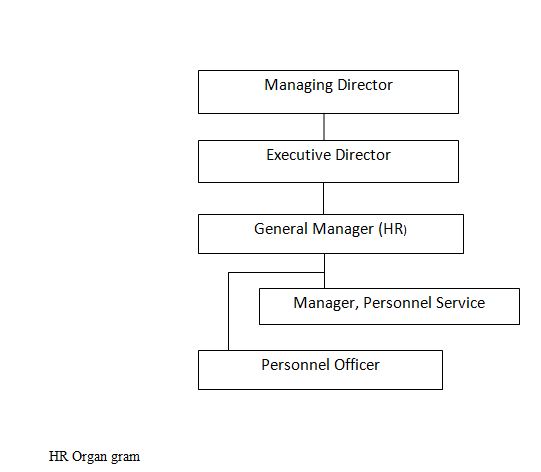 Human resource planning is the process of estimating human resource requirement for achieving human resource and organizational goals. It is the process through which organizational goals are translated into objective. At Dhaka-Shanghai Ceramics Ltd., they believe that their Human Resources give the company a significant competitive edge in terms of knowledge and experiences. Along the line up adopting new innovative and advanced technologies for its high-tech manufacturing plant, the company continued to draw talented and dynamic professionals of the industry, as well as, taking constructive steps in developing the skills of the human resource pool. The effective working days of this organization is 6 days per week and each employee will work 8 hours per day. If it is required to slot in them for overtime duties then the duty time will be utmost 50 hours/ weeks. Dhaka-Shanghai Ceramics Ltd. usually paid their salaries to employees within 10 days of the next month. They try maintaining to continuous development of the human resource through appropriate training and motivation.
Human resource planning is the process of estimating human resource requirement for achieving human resource and organizational goals. It is the process through which organizational goals are translated into objective. At Dhaka-Shanghai Ceramics Ltd., they believe that their Human Resources give the company a significant competitive edge in terms of knowledge and experiences. Along the line up adopting new innovative and advanced technologies for its high-tech manufacturing plant, the company continued to draw talented and dynamic professionals of the industry, as well as, taking constructive steps in developing the skills of the human resource pool. The effective working days of this organization is 6 days per week and each employee will work 8 hours per day. If it is required to slot in them for overtime duties then the duty time will be utmost 50 hours/ weeks. Dhaka-Shanghai Ceramics Ltd. usually paid their salaries to employees within 10 days of the next month. They try maintaining to continuous development of the human resource through appropriate training and motivation.
Recruiting and Selection policies and practice in Dhaka-Shanghai Ceramics Ltd.
DSCL beliefs, in present competitive and dynamic environment human resource department are the most valuable department than the others. They consider their skilled people as asserts for their organization. DSCL committed to draw the most talented and dynamic professionals from the available candidates. It follows both the internal and external sources of recruitment.
Recruiting is the process of searching the potential job candidates in order to fill up the vacant position of the organization and selection is the process of choosing the best candidate among the available candidates. The candidates who are successfully perform the job.
Dhaka-Shanghai Ceramics Ltd.follows both the internal and external sources of recruitment. In case of internal source they mainly follow – promotion, transfer and job rotation and in case of external source they follow – advertisement, employment agency.
In case of recruitment and selection Dhaka-Shanghai Ceramics Ltd. considers the following process:
Need assessment
Dhaka-Shanghai Ceramics Ltd. take need assessment to identify in which sector, it is needed to recruit the employee for achieving their target and goals. In their assessment they have to realize that they need human resource (HR) in the following situation- vacancy in existing post(s), market expansion, increase in production capacity, launching new product, introducing new system.
Checking the recruiting options
Internal
Current employees are a major source of recruits the employees but entry-level position. Internal source are included- promotion, transfer, job rotation, friends and relatives of existing employees. In Dhaka-Shanghai Ceramics Ltd. promotion and transfer are typically directed by operating manager with little involvement by the HRD
External
When job opening cannot be filled internally, the HRD must look outside organization for expert employees. External source included- advertisement, employment agencies, and campus recruiting. Usually Dhaka-Shanghai Ceramics Ltd. considers the advertisement for their external recruiting. They mainly provide the notice of available job in both Bangle and English dailies and job sites.
Screening and Short-listing Applications
The responses to the advertisements are sorted and screened. The CVs as well as the covering letters are judged. Experience, educational degree, computer literacy, etc are the basis of judging the candidates application.
Written test
It is the not important and effective tool for judging the candidates. The written test includes IQ test, behavioral competencies, and communication skills
Interview
The selection interview is a formal, in-depth conversation conducted to evaluate an applicant’s acceptability. Trough interviews the interviewers of Dhaka-Shanghai Ceramics Ltd. seek to answer three broad questions
1. Can the applicant do the job?
2. Will the applicant do the job?
3. How does the applicants compare with other who are being considered for the job?
Selection interview are most widely used selection technique. They can be adapted to unskilled, skilled, and managerial and staff employees. They also allow two-way exchange information: interviewers learn about the applicant and the applicants learn about the employer
Reference Checking
Reference and background check are important, which refers the process to undertake of those application that appear to offer potential as employees. Reference check is indented to verify that was state on the application from correct and accurate information. Some question are arises through reference checking. Those are:
1. Is the applicant a good, reliable worker?
2. Are the job accomplishments, titles, educational background, and other facts of the Resume or application true?
3. What type of person is the applicant?
4. What information id relevant to match the applicant and the job?
Medical check-up
Normally, the evaluation consists of a health checklist and asked the applicant to indicate the health and accident information. The medical evaluation may:
1. Entitle the employer to lower health or life insurance rates for company pain insurance.
2. Be required by state or local health officials, particularly in food handling operations where communicable diseases are a danger.
3. Be useful to evaluate where the applicant can handle the physical or mental stress of a job.
Offer letter
When the candidates satisfy the Human Resource Recruiting Broad, then the broad provide to the candidate offer letter.
Orientation /induction
Through orientation Dhaka-Shanghai Ceramics Ltd. try to introducing the new comers or new employees with its work unit, rules and regulation, culture, norms, value, believe and exposure to all important functions and locations of the company and so forth.
Follow up
For make the employee more effective and efficient Human Resource Department continuously interacts with the new entrants assisting to cope up with the work environment, work culture, peer groups etc. In this stage the management tries to help the employee to get settled her/his problems in the job, work environment and workplace-culture
Training and Development policies and practice in Dhaka-Shanghai Ceramics Ltd.
Training and development programs of DSCL include orientations, and socializations activities to inform employees about policies and procedures. DSCL try to develop their employee with future advancement and educate them in jobs kills. Training is a learning policies involves the acquisition of skills, concepts, rules, and attitudes to increases the performances of the employees in the organizations. On the other hand development is more future oriented, and more concerned with education, than is employees training or assisting a person to become a better performer. Dhaka-Shanghai Ceramics Ltd. gives emphasis both for internal and external training. Any new operations or product is marketed, they gives training to the employees attached to the operations. Development helps the individuals handle future responsibilities, with little concern for current job duties.
In order to excel in a competitive marketing environment there is no alternative to development knowledge and skilled level of people through training. Training and development program of DSCL include orientation activities that.
► Inform employees of policies and procedure of DSCL
► Educate them in job skills
► Develop them for future advancement
The above figure shows the sequences that should be followed by DSCL before any training and development begin. Need assessment identify the current problems and future challenges to be met through training and development. Then they set different training and development objectives for the new comers/ employees. Actual training program are set from the available program according to the performance of the employee. After the end of training period their skills, knowledge, and ability of working are evaluated. In the year 2012, the following training programs were conducted:
► MPO Recruitment training
► Team building and leadership
► Development of team building and leadership
► Development of managerial skills
Job Analysis and Job Evaluation in Dhaka-Shanghai Ceramics Ltd.
Job Analysis Policies and practice
Job analysis is the process of appraising the different positions of employees in the organization with a view to establish a well conceived for pay-structure. For job analysis DSCL consider several common uses such as- job definition, job re-design, orientation, socialization, carrier counseling, employee safety, performance appraisal and compensation. DSCL follows the observational method for job analysis. In this process they observe the individual or individuals performing the job and pertinent notes describing the jobs or describing the work.
This information includes such things as what was done, how it was done , how long it do, what the job environment was like, and what equipment was used. In this process information about jobs is systematically collected, evaluated, and organized. This action are usually done by human resource specialized about each job and every person in the organization. In the time of job analysis following matters are considered:
1. Identify the job to be analyzed.
2. Develop a job analysis questionnaire.
3. Collect appropriate job analysis information.
Job Evaluation Policies and practice
Dhaka-Shanghai Ceramics Ltd. follows the Ranking and the Classification method for evaluating the job. In case of ranking method a committee typically compared of both management and employee to representative to arrange the job in a simple rank order, from highest to the lowest rank. In case of classification method this classification are created by identified some common denominators like –skills, ability, knowledge, responsibilities with the desired objectives and goals being the creations of a number of distinct classes on grades of jobs.
Performance Appraisal Policies and practice in Dhaka-Shanghai Ceramics Ltd.
Performance appraisal information can provided needed input for determining both individual and organizational training and development needs. Another important use of performance appraisal is to encourage performance improvement. In this regard Performance appraisals are used as means of communicating to employees how they are doing and suggesting needed changes in behavior, attitude, skill or knowledge.
For apprising the performance Dhaka-Shanghai Ceramics Ltd. (DSCL) consider the different criteria of the employee, such as attendance, attitude, cooperation, initiative, dependability, quality of work, overall output, honesty, personality, ready to take challenge etc.
The process of evaluating the performance of the employee of Dhaka-Shanghai Ceramics Ltd. are shown in the following chart-
Based on the above mentioned criteria the rater provides score to the employee and according to the total score their performance is appraised. The human resource department (HRD) of DSCL usually designed and administers the above performance appraisal systems. For evaluating the performance appraisal DSCL mostly follows the rating scale method.
Leave Management Policies and Practice
Employees’ Leave Management helps Finance and HR Departments knowing that their leave programs are efficiently managed and accurately tracked. There are several types of leave the employees can apply for. These are:
- Earned Leave
- Sick Leave
- Extra ordinary leave
- Maternity Leave
Earned Leave
Earned leave is a type of leave that is earned by the employees through working in the organization and each working day an employee earns 0.0831 day leave. So the employees working five days a week will be able to spend 20 days of earned leave and hose employees working six days a week will be able to spend 23 days of earned leave per year.
Casual/Sick Leave
Employees can take sick leave with pay when they are sick and the disease is infectious. Employees can take up to 14 days including non-working days in a year as sick leave but if the disease takes more than 14 days to cure employees can take special permission from director and can have 21 days leave. In these cases the employees must provide all the documents of their sickness along with the leave form.
Extra Ordinary Leave
Company allows its employees to take extra ordinary leave for any kind of unavoidable and unusual situation. Employees can take leave for their higher education or treatment in abroad if approved by the director and can join Dhaka-Shanghai Ceramics Ltd. Ltd after they have finished.
Maternity Leave
Female employees who have passed more than one year in the organization are allowed to take maternity leave for four months while they are pregnant. Maternity leave is given with full payment and employees can also draw four months’ salary in advance. The employee also gets the allowances. Employees can extend their maternity leave but without payment. The female employees can have maternity leave twice while they work at Dhaka-Shanghai Ceramics Ltd.
Annual Leave
Annual leave encashment facilities may be allowed to the employees for a maximum of 90 days (based on last basic) at the time of employee’s leaving the organization.
Employee Compensation policies and practice in Dhaka-Shanghai Ceramics Ltd:
Compensation is what employee receives in exchange for their contribution to the organization including pay and benefits. Compensation may be defined as the remuneration for the time spent and physical and mental efforts invested by the employees. Compensation includes salary, wages and other financial and no financial and social rewards offered by the employer and accepted by the employees. Without adequate compensation, current employees are likely to leave and replacements will be difficult to recruit. Some common compensation policies are –
- Basic Salary and Wages
- Benefits
- Allowance
- Bonus
- Incentives
- Commission etc
Compensation policy
Company follows the following criteria:-
For Staff (GM to In-charge): Payment According to company policy. The policy is as follows:
Basic + house rent + medical + conveyance + food + technical allowance = total.
Workers: Payment According to law of Bangladesh gazette. The policy is as follows:
Basic + House rent + Medical + Benefit + Technical allowance + Shift allowance =Total
Pension Scheme:
There is no Pension Scheme facility in this organization.
Transport Facilities:
Transport facilities are fully provided by the company, under certain conditions, for the top level employees who come from distance place. But the lower level and mid level employees do not get this facility.
Determination of Total working hour:
Normal working hour: Total 8 hour a day including 45 minutes lunch break.
Work starting time: At 8:30 a.m. for worker & factory staff. At 9 a.m. for office staff.
Leave: At 4:30 p.m. for worker & factory staff. At 5 p.m. for office staff.
Overtime:
- Starts: At 4:30 p.m. to 6:30 p.m. (normally). Overtime allowed for workers. There is no overtime allowed for staff.
- Double pay for overtime
- International labor law, ILO rules are follows in case of overtime.
- Maximum 2 hours are granted as overtime for each worker.
Other Benefits:
Benefits means in addition to their wages or salaries, employee receives numerous supplemental rewards that are part of the employment exchanges. These supplemental rewards are referred to as employee benefits.
The company provides the following benefits:-
- Tiffin if any overtime with normal working hour.
- Employee welfare fund or financial aid only used for major operation, Major accident Clinic service.
- Mobile bill: It is given in particular situation. Generally to GM, AGM, Officer, Office Assistance, that is the persons who need to communicate with upper management and outsiders.
- Attendance bonus is taka hundred per month and festival bonus is two bonuses in a year.
- Lower level employee will get increment after six months and upper level personnel get increment after one year.
Promotion Policies and practices of Dhaka-Shanghai Ceramics Ltd.
The movement of personnel within an organization- their promotion, transfer, demotion, and separation is a major aspect of human resource management. The actual decision about whom to promote, and whom to fire can also be among the not difficult, and important, a manager has to make. For every organization promotion is extremely important, when the process based on merits and skills of the employee. The employee of Dhaka-Shanghai Ceramics Ltd. are gets both rewards and punishment from their employer based on their performance. Usually money transfer or other benefits are provided as rewards. On the other hand a major problem of promotion is discrimination and favoritism.
SWOT analysis
Dhaka Shanghai Ceramics Ltd has several powerful strength on which to build but our major weakness is lack of brand awareness and image. The major opportunity is demand for ceramic tiles that deliver valued benefits for customers. We also face threats from the competitors as well as downward pricing pressure.
Strengths:
- Strong relationship with manufacturers
- Excellent product line
- Seasoned management team
- Strong commitment
- Unique Design
Weakness:
- Lack of brand recognition.
- The need to taken on debt to get the business off the ground.
- New and innovative products do not have a lot of visibility in the market.
- Capital investment
- Lack of proper training
Opportunities:
- Participation in a growing market with a significant percentage of the target market still not aware of chefs and its products
- A strong distribution network
- Expand the market area
Threats:
- Future / potential competition with competitors
- High capital cost
- Political harassment
- High tax imposed
- Resource scarcity
Conclusion
This project paper presents new evidence in the effects of human resource management policies and practice such as modern recruitment system, performance appraisal, enhanced training program in ceramics industry. The evidence derived from authentic data and observation on Dhaka-Shanghai Ceramics Ltd. In present competitive and dynamic environment, human resource are now being viewed as the most valuable mean for gaining advantages over other. Competitive advantages can only be achieved by building up highly motivated and skilled employees. To fulfill the vision, mission, and core objectives of a company the management has needed to established a effective and efficient human resource department and hired the confident and most promising professionals.
Recommendations
Dhaka-Shanghai Ceramics Ltd has practiced the standard human resource management. Here I have some recommendations that identify avenues for improving the human resource management policies of DSCL. From my conversation with the HR manager, I found that many feel the need to improve their selection process. Although it is currently one of their strong aspects, it has reached a stage whereby an up gradation is imminent. In addition, with the increasingly changing world of business and fast moving skill requirements, the need to stay up-to-date in their recruitment process is felt even more.
They should conduct regular survey in their organization regarding various issues of HR within the organization and work according the result.
They should remain updated regarding the newly developed HR and MIS software so that they can practice proper guideline.
To get effective and efficient employee, the DSCL should arrange proper training and development programs.
The entire HR department should be well informed regarding the employment personal.
Employee’s development is needed for the own interest of the DSCL.
The organization should provide well direct compensation as well as direct to its staffs.
To evaluate employee’s performance the DSCL should follow promotion policy properly.
In order to get competitive advantage and to deliver quality product and customer service, top management should try to modify the system.
DSCL needs to advertise through various Media about job vacancies.
Periodical performance appraisal and giving recognition and rewards to the qualified employees to keep motivating them.
Proper training needed for ensuring efficient performance of the employees keep the ongoing pace to grab the business worldwide with more efficiently and effectively.
